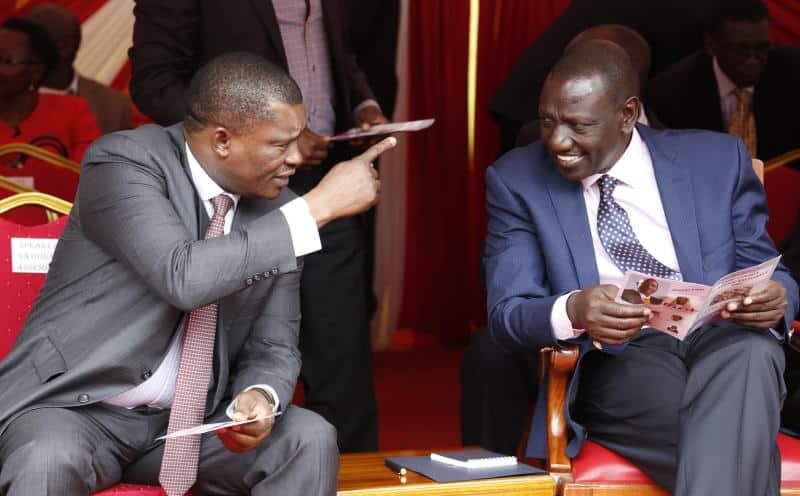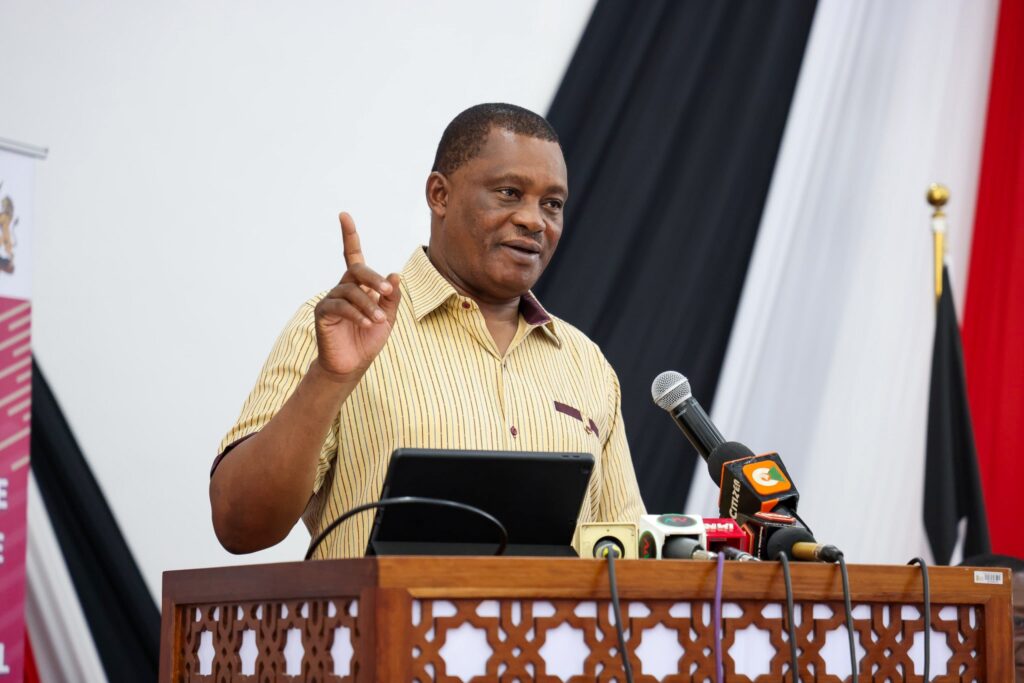
In a bold and unprecedented move, President William Ruto has officially dismissed former Attorney General Justin Muturi, signaling a significant shake-up within his administration. The decision, announced on Wednesday through a statement by Chief of Staff Felix Koskei, is expected to fortify the Cabinet and ensure its alignment with the government’s strategic agenda.
“His Excellency the President has today instituted further changes to the senior ranks of the executive within the Cabinet. By this presidential action, the Cabinet is set to achieve its constitutional full strength,” Koskei’s statement read.
Ruto Publicly Criticizes Muturi’s Performance

For the first time since taking office, President Ruto openly criticized Muturi’s competency, making it clear that his dissatisfaction had reached a tipping point. The rebuke came on Tuesday during a state Iftar dinner, where Ruto addressed concerns raised by Muslim leaders regarding the implementation of the Waqf Act (2022), a law that governs Islamic endowments meant for religious, educational, or charitable causes.
“I had a problem with the AG who was there before; he was fairly incompetent. But now, I have a very competent lady in the position, and I can assure you that the issues of Waqf will be sorted out within months,” Ruto stated, referring to the newly appointed Attorney General.
This blunt critique did not sit well with Muturi, who swiftly defended his record, arguing that the law does not explicitly provide for the establishment of a ‘Muslim Endowment Fund’ as had been expected by some religious leaders.
“Under the Waqf Act No.8 of 2022, there’s no provision for a ‘Muslim Endowment Fund.’ It must be understood that a Waqf is a religious, charitable, or benevolent endowment by a person who professes the Muslim faith and is managed by the WaqfCommission,” Muturi responded.
A Growing Rift: Muturi’s Increasing Isolation in Cabinet

Muturi’s sacking was not entirely unexpected. His relationship with the Ruto administration had been deteriorating for months, particularly after he took a firm stand against abductions and extrajudicial killings in the country. Since January, Muturi had consistently voiced concerns over enforced disappearances, calling for accountability and transparency in law enforcement operations.
His outspokenness on the issue led to tensions within the government, with some insiders speculating that he had fallen out of favor with the President. In a move that raised eyebrows, Muturi formally requested to skip Cabinet meetings, stating that he would not participate until the matter of enforced disappearances was addressed.
“Attending Cabinet meetings is mandatory unless one has permission from the President, which is what I sought,” Muturiclarified during an interview on Citizen TV. He dismissed claims that his absence was an act of defiance, instead framing it as a principled stand.https://shorturl.at/ip4Zf
His absence from key government meetings, however, only deepened his isolation. Since January, he had not attended a single Cabinet meeting, further fueling speculation about his future in the administration.
A Personal Blow: The Abduction of Muturi’s Son
The tensions between Muturi and the government escalated in January when his son, Lesly Muturi, was kidnapped. The high-profile abduction sent shockwaves across the political landscape, raising questions about the safety of high-ranking officials and their families.
Muturi later revealed that he had personally reached out to President Ruto for assistance. In response, Ruto reportedly contacted National Intelligence Service (NIS) Director NoordinHaji, leading to Lesly’s release. However, the ordeal seemed to deepen the rift between Muturi and the government, as he continued to demand accountability for other victims of abduction.
Despite mounting pressure and speculation about his possible resignation, Muturi remained adamant that he had no intention of stepping down.
“I’m still in government because I’m in that coalition, and secondly, I participated actively in campaigning for Kenya Kwanza in the 2022 General Elections. Therefore, I’m perfectly in my right to be in government,” he asserted.
Political Implications: What Next for Muturi?
Muturi’s firing raises several questions about the future of the Kenya Kwanza government and the internal dynamics within the ruling coalition. His departure underscores President Ruto’sdetermination to consolidate power and maintain a Cabinet that fully aligns with his vision.
For Muturi, this dismissal could mark the beginning of a political realignment. As a former Speaker of the National Assembly, he commands a level of influence that cannot be easily overlooked. Political analysts suggest that he may pivot towards opposition politics or carve out an independent path, leveraging his reputation as a principled leader who stood up against government excesses.
Meanwhile, Ruto’s decisive action sends a strong message to other government officials: loyalty and efficiency are non-negotiable. The President has made it clear that those who do not align with his policies or who challenge his authority may find themselves sidelined.
Public Reaction and the Road Ahead
Reactions to Muturi’s sacking have been mixed. Supporters of the Ruto administration see it as a necessary step to strengthen governance and ensure effective leadership within the Cabinet. Critics, however, argue that Muturi’s dismissal was politically motivated and tied to his outspoken stance on human rights issues.
The Kenyan public is now watching closely to see how the government will address the concerns Muturi raised, particularly regarding abductions and extrajudicial killings. If these issues persist, Ruto’s administration may face growing scrutiny from human rights organizations and the international community.
As for Muturi, his next move will be crucial in determining his political future. Whether he chooses to remain within the Kenya Kwanza coalition or venture into opposition politics, one thing is certain—his voice is unlikely to be silenced anytime soon.
Conclusion: A Cabinet in Transition
President Ruto’s decision to fire Justin Muturi is more than just a personnel change; it is a signal of a broader shift within his government. By removing a senior official who had increasingly become a dissenting voice, Ruto is reaffirming his grip on power and setting the stage for a more streamlined administration.
However, this move also comes with risks. If not handled carefully, it could deepen divisions within the ruling coalition and give political opponents fresh ammunition against the government. As Kenya’s political landscape continues to evolve, one thing is clear—Muturi’s departure marks the beginning of a new chapter in the Ruto administration’s journey.
Only time will tell whether this shake-up will strengthen the government or open the door to further political realignments.https://touchdigitalnews.com/president-ruto-set-to-begin-mt-kenya-region-tour/